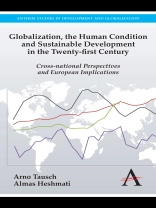‘Globalization, the Human Condition and Sustainable Development in the Twenty-first Century: Cross-national Perspectives and European Implications’ is a cross-national, 175 nation based exploration of the deep crisis in which Europe currently finds itself. Investigating the effects of dependency theory and world systems theory upon the global success of eight dimensions of development – including democracy, environmental sustainability, employment, social cohesion, high quality tertiary education and gender justice – this study argues that the current European crisis has been precipitated by the pro-globalist policies of the European Commission.
The comprehensive analysis of this study reveals the magnitude of Europe’s errors. Lowering comparative price levels and increasing dependency on large, transnational corporations, as correctly predicted by Latin American social science of the 1960s and 1970s, emerges as one of the most serious developmental blockades confronting Europe in global society, whilst increases in military expenditure, as proposed by Article 42.3 of the European Union’s Lisbon Treaty, are another large stumbling block against development. The harmful potential of these blockades is severe.
The book’s 175-nation investigation shows that Europe’s failure to develop its own MNC headquarter status in the global economy is a key factor that has hindered its developmental performance. This examination, which duly takes into account the control variables proposed by neoclassical economics and contemporary sociology/political science, also demonstrates the potential outcomes of several alternative scenarios, mainly those proposed by the political Left in Europe, and summarizes the effects of globalization on the environment and ecological vulnerability. What this analysis makes most clear is Europe’s need for change: without amending its pro-globalist policies, the continent will learn nothing from its current crisis – and is destined to compete in a destructive “race to the bottom”.
Tabella dei contenuti
List of Abbreviations; Glossary of Key Terms; Foreword; Preface; 1. Should the Musicians Continue to Play?; 2. Background; 3. Methods; 4. Cross-national Results: Beyond the Pro-globalist Development Approach of the European Commission; 5. Final Cross-national Results for the Combined Development Indicator; 6. A Time Series Perspective on Globalization, Growth and Inequality; 7. Conclusions; Appendix 1: Multiple Regressions – The Dependency Model, Tested against Feminist, Demographic, Neoliberal, Geographic, Cultural, Peace Research and Human Capital Policy Predictors, Migration Theories and Integration Theories; Appendix 2: The Crisis Performance Index (Factor Analytical), 2009–2010 and After; Appendix 3: The Dynamics of Globalization since 1980 in 29 Major Economies of the World – The Time Series; Appendix 4: The Dynamics of Globalization and Inequality since 1970 in Some Major Developing Economies and in the World System as a Whole; Appendix 5: A Non-parametric Global Development Index, Based on 35 Variables; Appendix 6: A Non-parametric Global Development Index, Based on 30 Variables and Its Multivariate Determinants; Appendix 7: The Sources for the Cross-national Data Collection; A Commented Guide to the Literature; References; Index of Persons and Authorships; Index of Subjects and Countries
Circa l’autore
Arno Tausch is Visiting Professor of Economics at Corvinus University in Budapest, Hungary and Adjunct Professor of Political Science at Innsbruck University, Austria.
Almas Heshmati is Professor of Economics at Sogang University.












